Analysis of HR Skills, Development, Performance in Organizations
VerifiedAdded on 2023/01/05
|16
|5177
|79
Report
AI Summary
This report delves into the critical skills, knowledge, and behaviors essential for HR professionals. It begins by outlining the core competencies required for effective HR management, emphasizing communication, decision-making, and organizational skills, along with a comprehensive understanding of HR-related laws and administration. The report then presents a personal skills audit, utilizing a SWOT analysis to identify strengths, weaknesses, opportunities, and threats within an HR context, leading to the development of a professional development plan. It further explores the distinctions between organizational and individual learning, training, and development, highlighting their impact on employee performance and organizational success. The report also analyzes the necessity of continuous learning and professional development for driving sustainable business performance, discussing the role of High-Performance Work Systems (HPWS) in employee engagement and competitive advantage. Finally, it examines different approaches to performance management and their contribution to fostering a high-performance culture and employee commitment, providing a comprehensive overview of key HR principles and practices. This report is designed to provide students with a detailed understanding of these concepts and their practical applications.
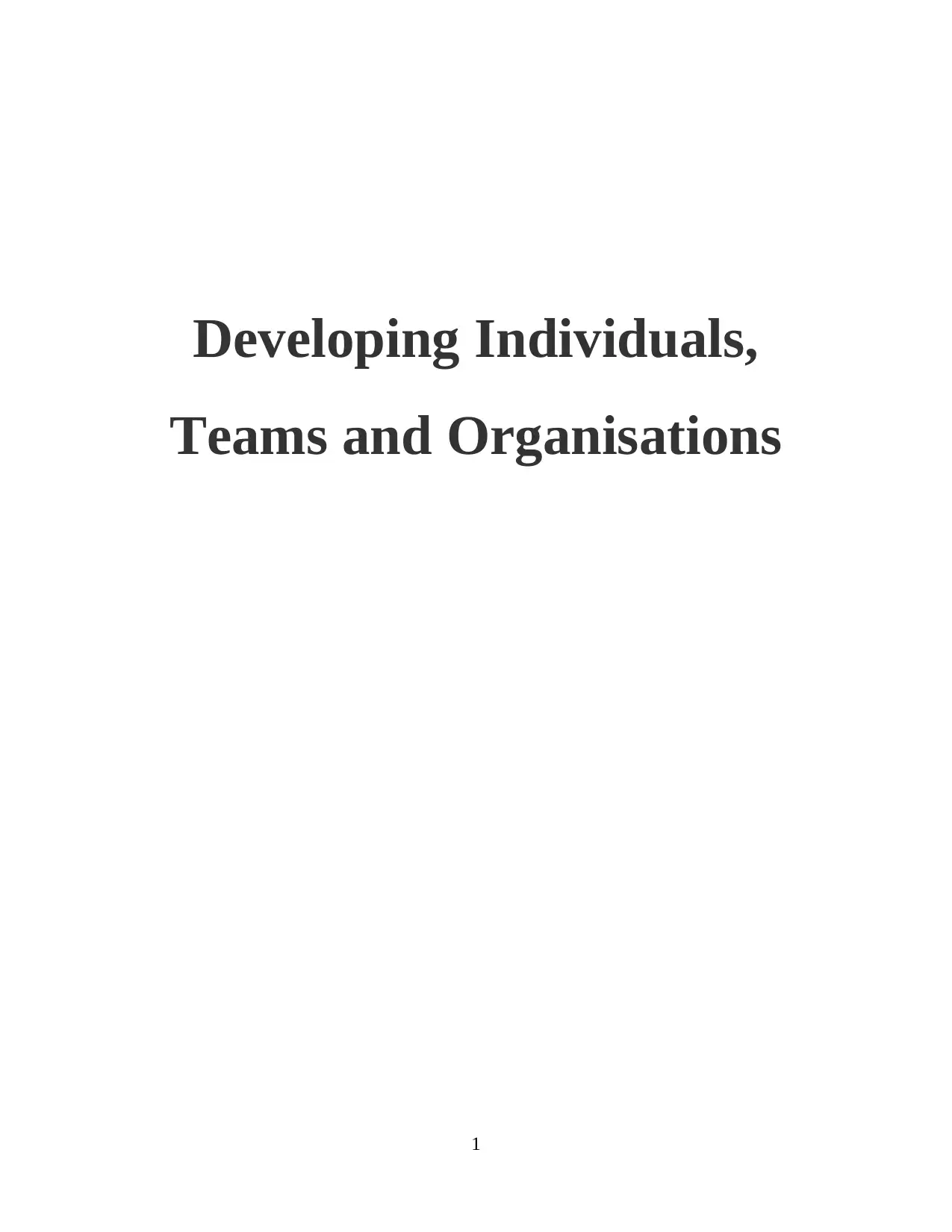
Developing Individuals,
Teams and Organisations
1
Teams and Organisations
1
Paraphrase This Document
Need a fresh take? Get an instant paraphrase of this document with our AI Paraphraser
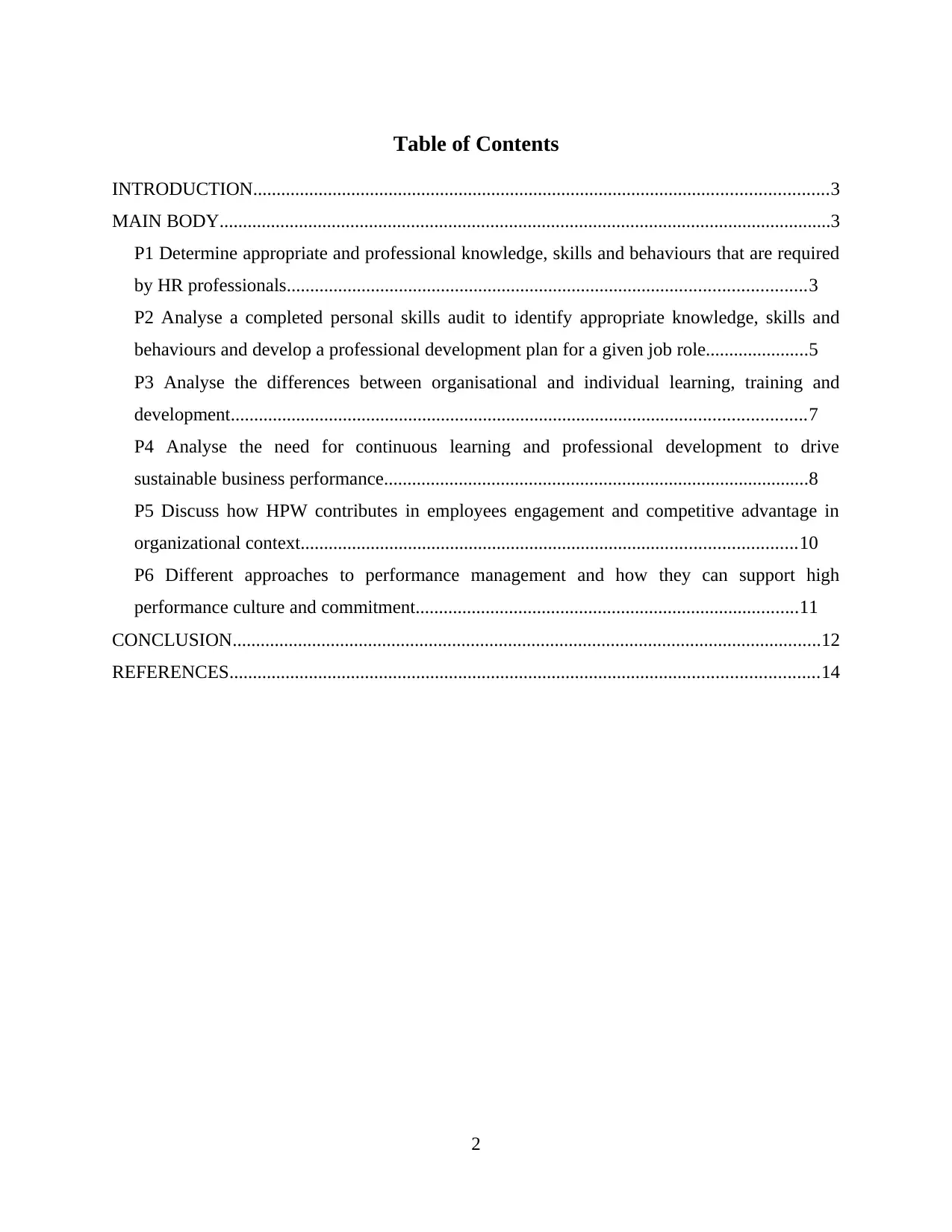
Table of Contents
INTRODUCTION...........................................................................................................................3
MAIN BODY...................................................................................................................................3
P1 Determine appropriate and professional knowledge, skills and behaviours that are required
by HR professionals...............................................................................................................3
P2 Analyse a completed personal skills audit to identify appropriate knowledge, skills and
behaviours and develop a professional development plan for a given job role......................5
P3 Analyse the differences between organisational and individual learning, training and
development...........................................................................................................................7
P4 Analyse the need for continuous learning and professional development to drive
sustainable business performance...........................................................................................8
P5 Discuss how HPW contributes in employees engagement and competitive advantage in
organizational context..........................................................................................................10
P6 Different approaches to performance management and how they can support high
performance culture and commitment..................................................................................11
CONCLUSION..............................................................................................................................12
REFERENCES..............................................................................................................................14
2
INTRODUCTION...........................................................................................................................3
MAIN BODY...................................................................................................................................3
P1 Determine appropriate and professional knowledge, skills and behaviours that are required
by HR professionals...............................................................................................................3
P2 Analyse a completed personal skills audit to identify appropriate knowledge, skills and
behaviours and develop a professional development plan for a given job role......................5
P3 Analyse the differences between organisational and individual learning, training and
development...........................................................................................................................7
P4 Analyse the need for continuous learning and professional development to drive
sustainable business performance...........................................................................................8
P5 Discuss how HPW contributes in employees engagement and competitive advantage in
organizational context..........................................................................................................10
P6 Different approaches to performance management and how they can support high
performance culture and commitment..................................................................................11
CONCLUSION..............................................................................................................................12
REFERENCES..............................................................................................................................14
2
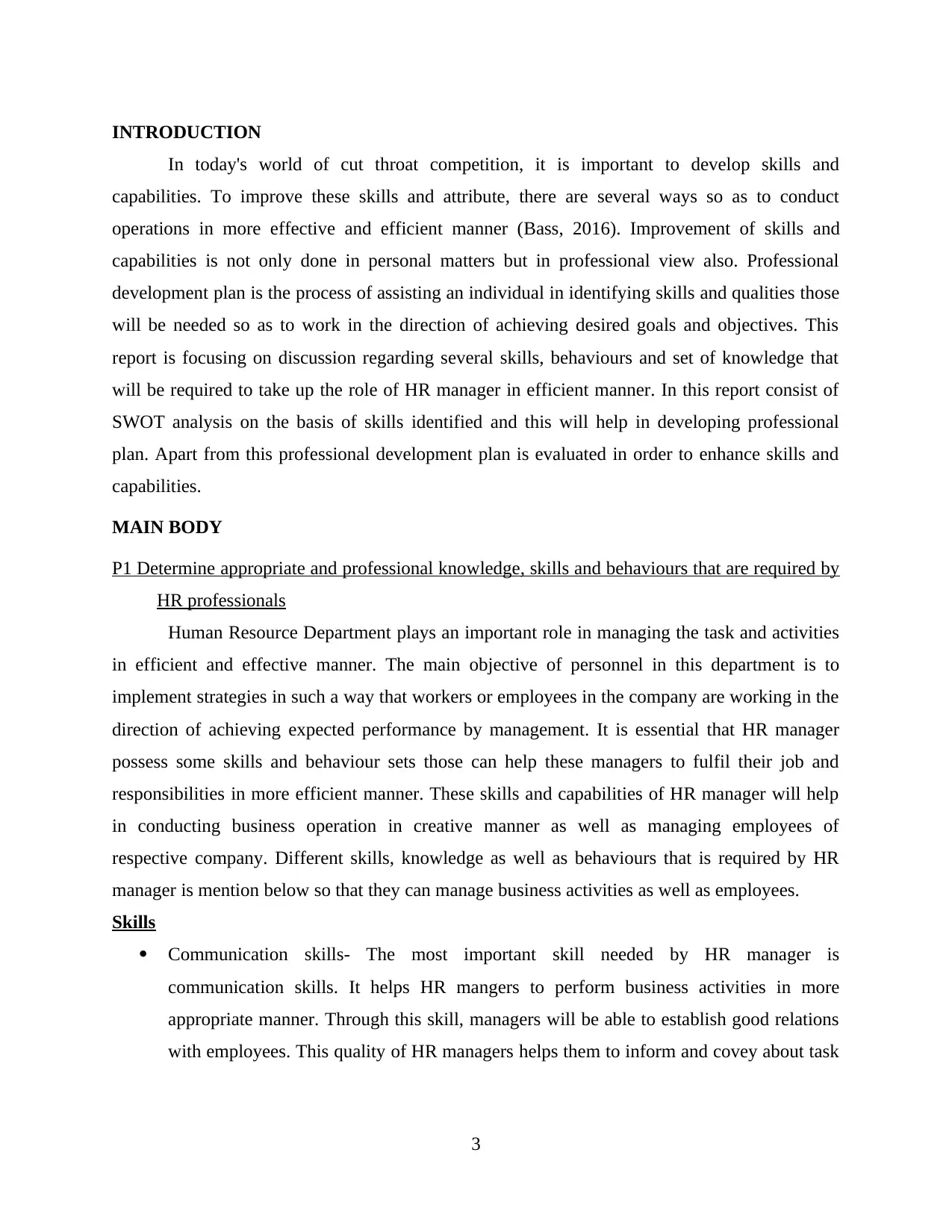
INTRODUCTION
In today's world of cut throat competition, it is important to develop skills and
capabilities. To improve these skills and attribute, there are several ways so as to conduct
operations in more effective and efficient manner (Bass, 2016). Improvement of skills and
capabilities is not only done in personal matters but in professional view also. Professional
development plan is the process of assisting an individual in identifying skills and qualities those
will be needed so as to work in the direction of achieving desired goals and objectives. This
report is focusing on discussion regarding several skills, behaviours and set of knowledge that
will be required to take up the role of HR manager in efficient manner. In this report consist of
SWOT analysis on the basis of skills identified and this will help in developing professional
plan. Apart from this professional development plan is evaluated in order to enhance skills and
capabilities.
MAIN BODY
P1 Determine appropriate and professional knowledge, skills and behaviours that are required by
HR professionals
Human Resource Department plays an important role in managing the task and activities
in efficient and effective manner. The main objective of personnel in this department is to
implement strategies in such a way that workers or employees in the company are working in the
direction of achieving expected performance by management. It is essential that HR manager
possess some skills and behaviour sets those can help these managers to fulfil their job and
responsibilities in more efficient manner. These skills and capabilities of HR manager will help
in conducting business operation in creative manner as well as managing employees of
respective company. Different skills, knowledge as well as behaviours that is required by HR
manager is mention below so that they can manage business activities as well as employees.
Skills
Communication skills- The most important skill needed by HR manager is
communication skills. It helps HR mangers to perform business activities in more
appropriate manner. Through this skill, managers will be able to establish good relations
with employees. This quality of HR managers helps them to inform and covey about task
3
In today's world of cut throat competition, it is important to develop skills and
capabilities. To improve these skills and attribute, there are several ways so as to conduct
operations in more effective and efficient manner (Bass, 2016). Improvement of skills and
capabilities is not only done in personal matters but in professional view also. Professional
development plan is the process of assisting an individual in identifying skills and qualities those
will be needed so as to work in the direction of achieving desired goals and objectives. This
report is focusing on discussion regarding several skills, behaviours and set of knowledge that
will be required to take up the role of HR manager in efficient manner. In this report consist of
SWOT analysis on the basis of skills identified and this will help in developing professional
plan. Apart from this professional development plan is evaluated in order to enhance skills and
capabilities.
MAIN BODY
P1 Determine appropriate and professional knowledge, skills and behaviours that are required by
HR professionals
Human Resource Department plays an important role in managing the task and activities
in efficient and effective manner. The main objective of personnel in this department is to
implement strategies in such a way that workers or employees in the company are working in the
direction of achieving expected performance by management. It is essential that HR manager
possess some skills and behaviour sets those can help these managers to fulfil their job and
responsibilities in more efficient manner. These skills and capabilities of HR manager will help
in conducting business operation in creative manner as well as managing employees of
respective company. Different skills, knowledge as well as behaviours that is required by HR
manager is mention below so that they can manage business activities as well as employees.
Skills
Communication skills- The most important skill needed by HR manager is
communication skills. It helps HR mangers to perform business activities in more
appropriate manner. Through this skill, managers will be able to establish good relations
with employees. This quality of HR managers helps them to inform and covey about task
3
⊘ This is a preview!⊘
Do you want full access?
Subscribe today to unlock all pages.

Trusted by 1+ million students worldwide
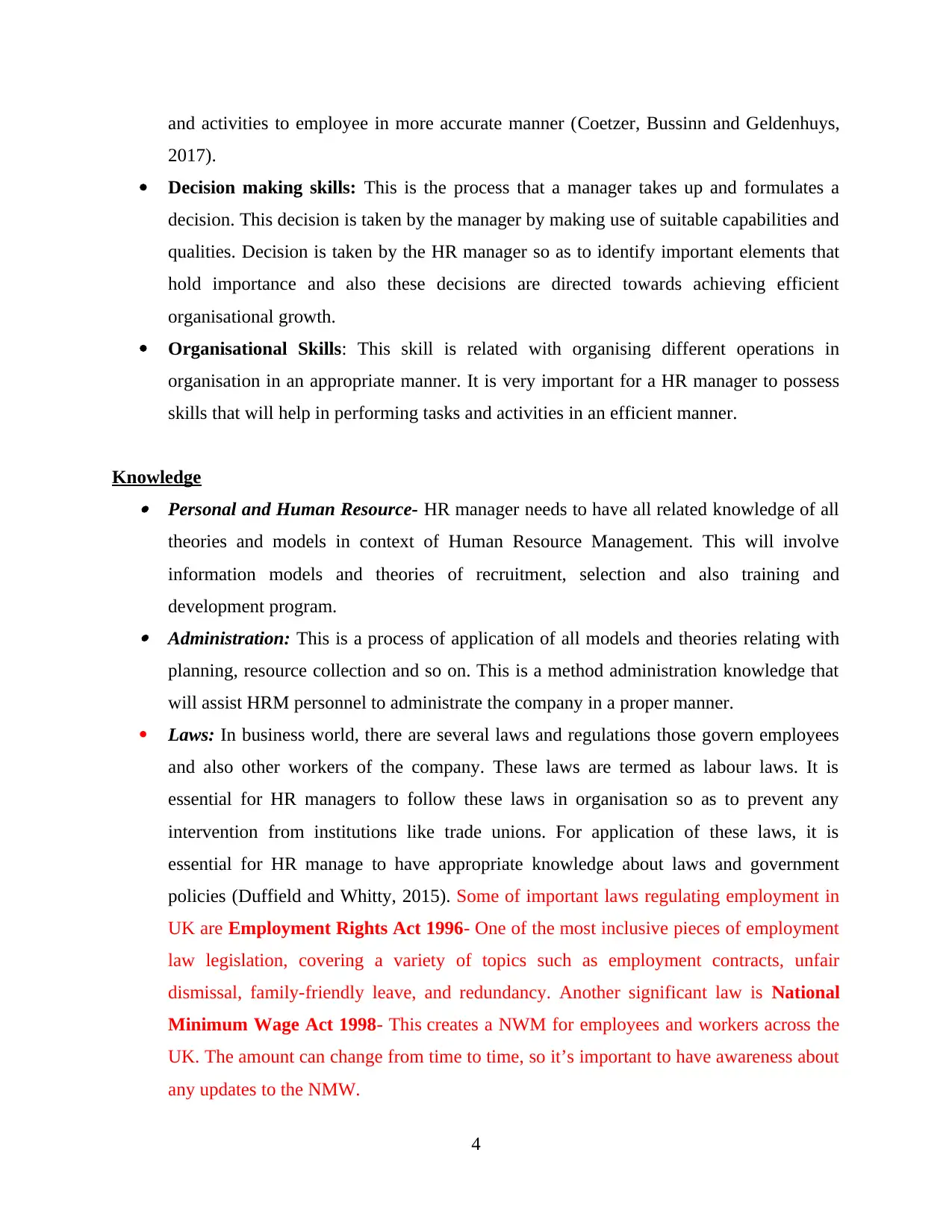
and activities to employee in more accurate manner (Coetzer, Bussinn and Geldenhuys,
2017).
Decision making skills: This is the process that a manager takes up and formulates a
decision. This decision is taken by the manager by making use of suitable capabilities and
qualities. Decision is taken by the HR manager so as to identify important elements that
hold importance and also these decisions are directed towards achieving efficient
organisational growth.
Organisational Skills: This skill is related with organising different operations in
organisation in an appropriate manner. It is very important for a HR manager to possess
skills that will help in performing tasks and activities in an efficient manner.
Knowledge Personal and Human Resource- HR manager needs to have all related knowledge of all
theories and models in context of Human Resource Management. This will involve
information models and theories of recruitment, selection and also training and
development program. Administration: This is a process of application of all models and theories relating with
planning, resource collection and so on. This is a method administration knowledge that
will assist HRM personnel to administrate the company in a proper manner.
Laws: In business world, there are several laws and regulations those govern employees
and also other workers of the company. These laws are termed as labour laws. It is
essential for HR managers to follow these laws in organisation so as to prevent any
intervention from institutions like trade unions. For application of these laws, it is
essential for HR manage to have appropriate knowledge about laws and government
policies (Duffield and Whitty, 2015). Some of important laws regulating employment in
UK are Employment Rights Act 1996- One of the most inclusive pieces of employment
law legislation, covering a variety of topics such as employment contracts, unfair
dismissal, family-friendly leave, and redundancy. Another significant law is National
Minimum Wage Act 1998- This creates a NWM for employees and workers across the
UK. The amount can change from time to time, so it’s important to have awareness about
any updates to the NMW.
4
2017).
Decision making skills: This is the process that a manager takes up and formulates a
decision. This decision is taken by the manager by making use of suitable capabilities and
qualities. Decision is taken by the HR manager so as to identify important elements that
hold importance and also these decisions are directed towards achieving efficient
organisational growth.
Organisational Skills: This skill is related with organising different operations in
organisation in an appropriate manner. It is very important for a HR manager to possess
skills that will help in performing tasks and activities in an efficient manner.
Knowledge Personal and Human Resource- HR manager needs to have all related knowledge of all
theories and models in context of Human Resource Management. This will involve
information models and theories of recruitment, selection and also training and
development program. Administration: This is a process of application of all models and theories relating with
planning, resource collection and so on. This is a method administration knowledge that
will assist HRM personnel to administrate the company in a proper manner.
Laws: In business world, there are several laws and regulations those govern employees
and also other workers of the company. These laws are termed as labour laws. It is
essential for HR managers to follow these laws in organisation so as to prevent any
intervention from institutions like trade unions. For application of these laws, it is
essential for HR manage to have appropriate knowledge about laws and government
policies (Duffield and Whitty, 2015). Some of important laws regulating employment in
UK are Employment Rights Act 1996- One of the most inclusive pieces of employment
law legislation, covering a variety of topics such as employment contracts, unfair
dismissal, family-friendly leave, and redundancy. Another significant law is National
Minimum Wage Act 1998- This creates a NWM for employees and workers across the
UK. The amount can change from time to time, so it’s important to have awareness about
any updates to the NMW.
4
Paraphrase This Document
Need a fresh take? Get an instant paraphrase of this document with our AI Paraphraser
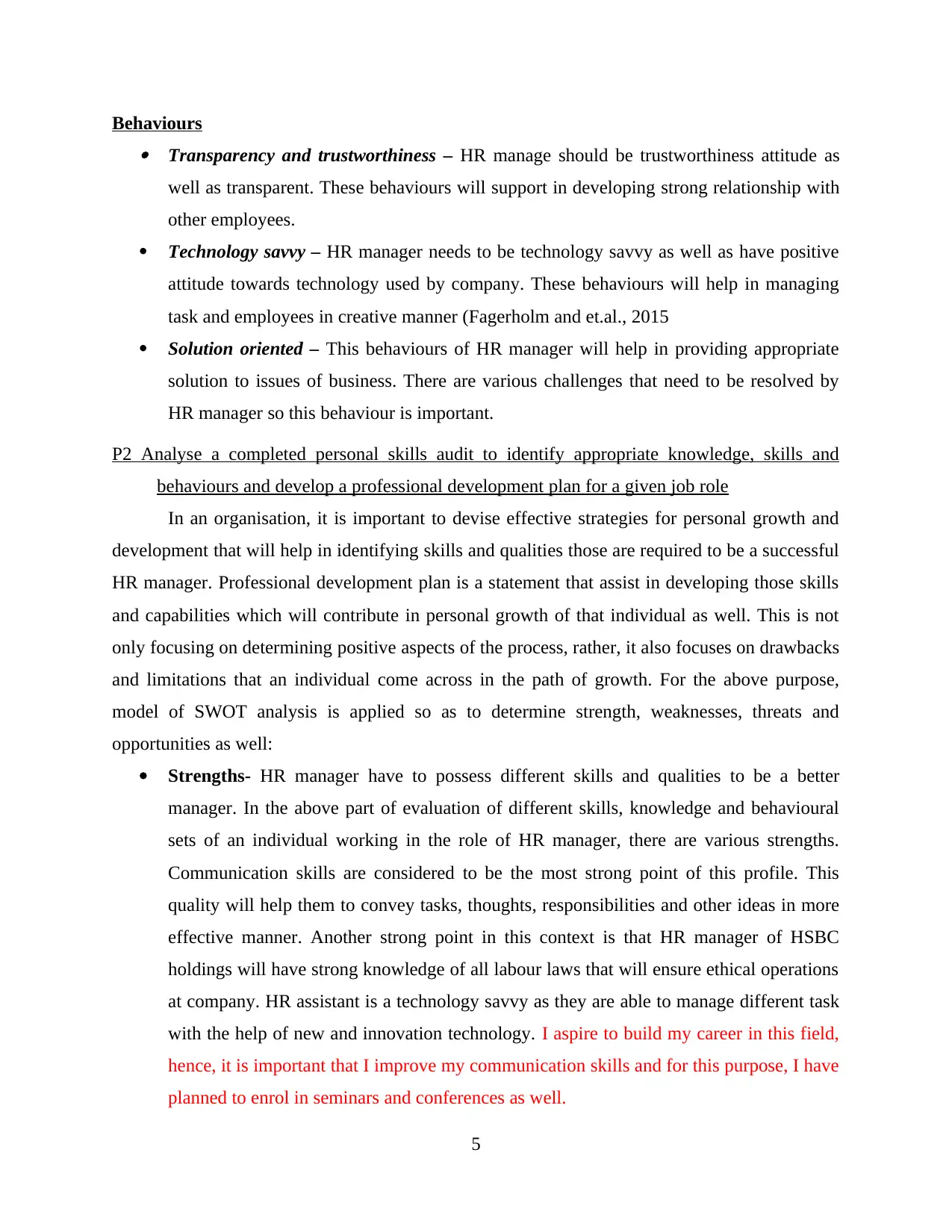
Behaviours Transparency and trustworthiness – HR manage should be trustworthiness attitude as
well as transparent. These behaviours will support in developing strong relationship with
other employees.
Technology savvy – HR manager needs to be technology savvy as well as have positive
attitude towards technology used by company. These behaviours will help in managing
task and employees in creative manner (Fagerholm and et.al., 2015
Solution oriented – This behaviours of HR manager will help in providing appropriate
solution to issues of business. There are various challenges that need to be resolved by
HR manager so this behaviour is important.
P2 Analyse a completed personal skills audit to identify appropriate knowledge, skills and
behaviours and develop a professional development plan for a given job role
In an organisation, it is important to devise effective strategies for personal growth and
development that will help in identifying skills and qualities those are required to be a successful
HR manager. Professional development plan is a statement that assist in developing those skills
and capabilities which will contribute in personal growth of that individual as well. This is not
only focusing on determining positive aspects of the process, rather, it also focuses on drawbacks
and limitations that an individual come across in the path of growth. For the above purpose,
model of SWOT analysis is applied so as to determine strength, weaknesses, threats and
opportunities as well:
Strengths- HR manager have to possess different skills and qualities to be a better
manager. In the above part of evaluation of different skills, knowledge and behavioural
sets of an individual working in the role of HR manager, there are various strengths.
Communication skills are considered to be the most strong point of this profile. This
quality will help them to convey tasks, thoughts, responsibilities and other ideas in more
effective manner. Another strong point in this context is that HR manager of HSBC
holdings will have strong knowledge of all labour laws that will ensure ethical operations
at company. HR assistant is a technology savvy as they are able to manage different task
with the help of new and innovation technology. I aspire to build my career in this field,
hence, it is important that I improve my communication skills and for this purpose, I have
planned to enrol in seminars and conferences as well.
5
well as transparent. These behaviours will support in developing strong relationship with
other employees.
Technology savvy – HR manager needs to be technology savvy as well as have positive
attitude towards technology used by company. These behaviours will help in managing
task and employees in creative manner (Fagerholm and et.al., 2015
Solution oriented – This behaviours of HR manager will help in providing appropriate
solution to issues of business. There are various challenges that need to be resolved by
HR manager so this behaviour is important.
P2 Analyse a completed personal skills audit to identify appropriate knowledge, skills and
behaviours and develop a professional development plan for a given job role
In an organisation, it is important to devise effective strategies for personal growth and
development that will help in identifying skills and qualities those are required to be a successful
HR manager. Professional development plan is a statement that assist in developing those skills
and capabilities which will contribute in personal growth of that individual as well. This is not
only focusing on determining positive aspects of the process, rather, it also focuses on drawbacks
and limitations that an individual come across in the path of growth. For the above purpose,
model of SWOT analysis is applied so as to determine strength, weaknesses, threats and
opportunities as well:
Strengths- HR manager have to possess different skills and qualities to be a better
manager. In the above part of evaluation of different skills, knowledge and behavioural
sets of an individual working in the role of HR manager, there are various strengths.
Communication skills are considered to be the most strong point of this profile. This
quality will help them to convey tasks, thoughts, responsibilities and other ideas in more
effective manner. Another strong point in this context is that HR manager of HSBC
holdings will have strong knowledge of all labour laws that will ensure ethical operations
at company. HR assistant is a technology savvy as they are able to manage different task
with the help of new and innovation technology. I aspire to build my career in this field,
hence, it is important that I improve my communication skills and for this purpose, I have
planned to enrol in seminars and conferences as well.
5
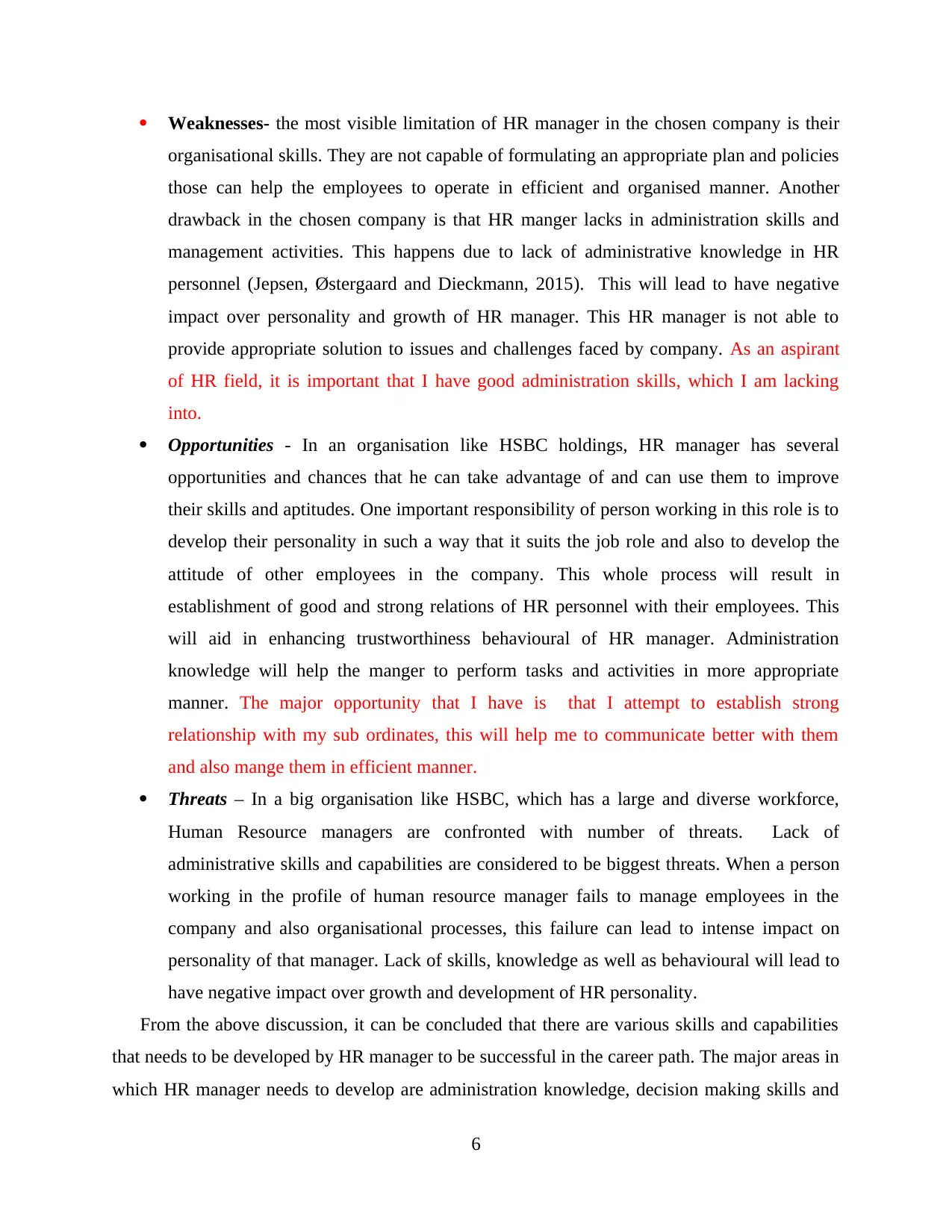
Weaknesses- the most visible limitation of HR manager in the chosen company is their
organisational skills. They are not capable of formulating an appropriate plan and policies
those can help the employees to operate in efficient and organised manner. Another
drawback in the chosen company is that HR manger lacks in administration skills and
management activities. This happens due to lack of administrative knowledge in HR
personnel (Jepsen, Østergaard and Dieckmann, 2015). This will lead to have negative
impact over personality and growth of HR manager. This HR manager is not able to
provide appropriate solution to issues and challenges faced by company. As an aspirant
of HR field, it is important that I have good administration skills, which I am lacking
into.
Opportunities - In an organisation like HSBC holdings, HR manager has several
opportunities and chances that he can take advantage of and can use them to improve
their skills and aptitudes. One important responsibility of person working in this role is to
develop their personality in such a way that it suits the job role and also to develop the
attitude of other employees in the company. This whole process will result in
establishment of good and strong relations of HR personnel with their employees. This
will aid in enhancing trustworthiness behavioural of HR manager. Administration
knowledge will help the manger to perform tasks and activities in more appropriate
manner. The major opportunity that I have is that I attempt to establish strong
relationship with my sub ordinates, this will help me to communicate better with them
and also mange them in efficient manner.
Threats – In a big organisation like HSBC, which has a large and diverse workforce,
Human Resource managers are confronted with number of threats. Lack of
administrative skills and capabilities are considered to be biggest threats. When a person
working in the profile of human resource manager fails to manage employees in the
company and also organisational processes, this failure can lead to intense impact on
personality of that manager. Lack of skills, knowledge as well as behavioural will lead to
have negative impact over growth and development of HR personality.
From the above discussion, it can be concluded that there are various skills and capabilities
that needs to be developed by HR manager to be successful in the career path. The major areas in
which HR manager needs to develop are administration knowledge, decision making skills and
6
organisational skills. They are not capable of formulating an appropriate plan and policies
those can help the employees to operate in efficient and organised manner. Another
drawback in the chosen company is that HR manger lacks in administration skills and
management activities. This happens due to lack of administrative knowledge in HR
personnel (Jepsen, Østergaard and Dieckmann, 2015). This will lead to have negative
impact over personality and growth of HR manager. This HR manager is not able to
provide appropriate solution to issues and challenges faced by company. As an aspirant
of HR field, it is important that I have good administration skills, which I am lacking
into.
Opportunities - In an organisation like HSBC holdings, HR manager has several
opportunities and chances that he can take advantage of and can use them to improve
their skills and aptitudes. One important responsibility of person working in this role is to
develop their personality in such a way that it suits the job role and also to develop the
attitude of other employees in the company. This whole process will result in
establishment of good and strong relations of HR personnel with their employees. This
will aid in enhancing trustworthiness behavioural of HR manager. Administration
knowledge will help the manger to perform tasks and activities in more appropriate
manner. The major opportunity that I have is that I attempt to establish strong
relationship with my sub ordinates, this will help me to communicate better with them
and also mange them in efficient manner.
Threats – In a big organisation like HSBC, which has a large and diverse workforce,
Human Resource managers are confronted with number of threats. Lack of
administrative skills and capabilities are considered to be biggest threats. When a person
working in the profile of human resource manager fails to manage employees in the
company and also organisational processes, this failure can lead to intense impact on
personality of that manager. Lack of skills, knowledge as well as behavioural will lead to
have negative impact over growth and development of HR personality.
From the above discussion, it can be concluded that there are various skills and capabilities
that needs to be developed by HR manager to be successful in the career path. The major areas in
which HR manager needs to develop are administration knowledge, decision making skills and
6
⊘ This is a preview!⊘
Do you want full access?
Subscribe today to unlock all pages.

Trusted by 1+ million students worldwide
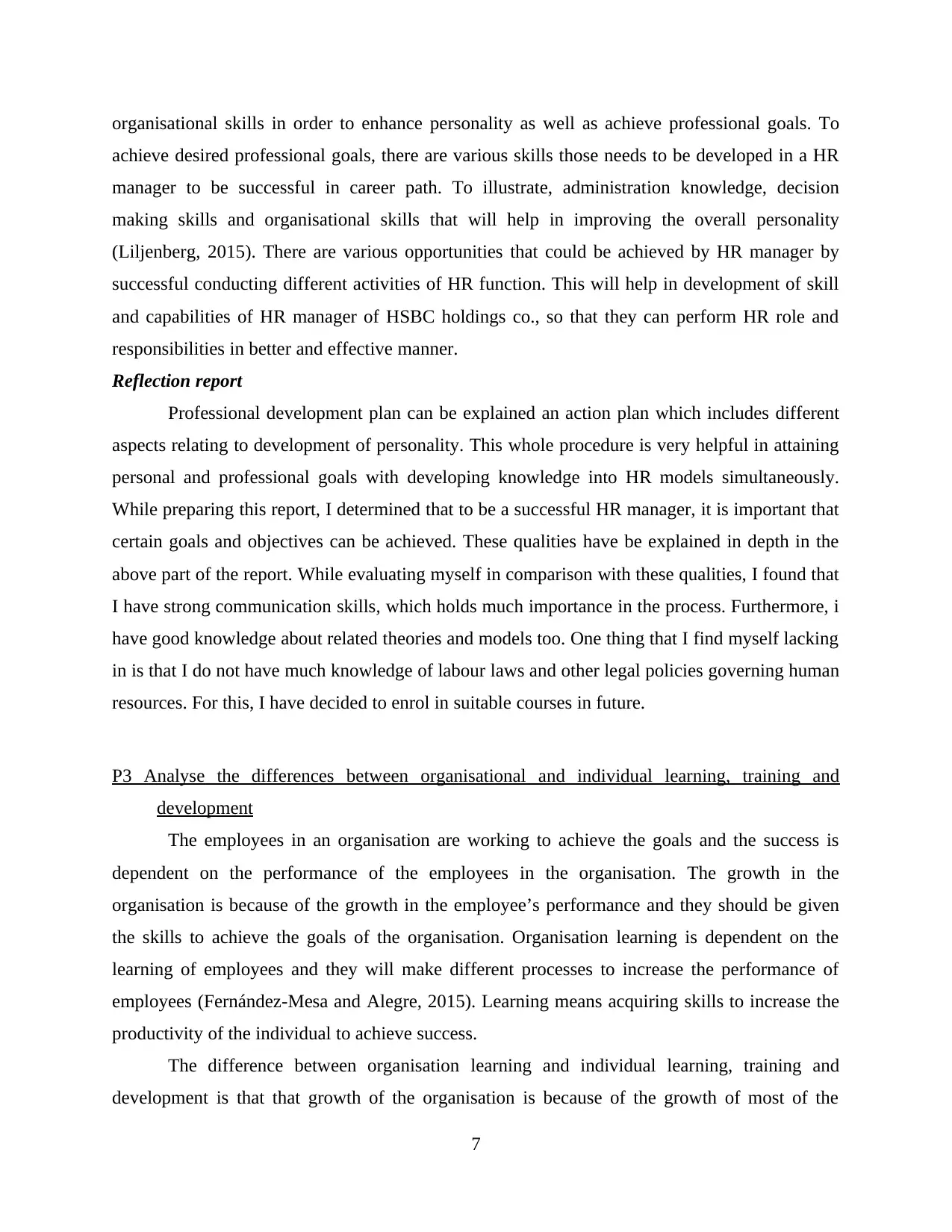
organisational skills in order to enhance personality as well as achieve professional goals. To
achieve desired professional goals, there are various skills those needs to be developed in a HR
manager to be successful in career path. To illustrate, administration knowledge, decision
making skills and organisational skills that will help in improving the overall personality
(Liljenberg, 2015). There are various opportunities that could be achieved by HR manager by
successful conducting different activities of HR function. This will help in development of skill
and capabilities of HR manager of HSBC holdings co., so that they can perform HR role and
responsibilities in better and effective manner.
Reflection report
Professional development plan can be explained an action plan which includes different
aspects relating to development of personality. This whole procedure is very helpful in attaining
personal and professional goals with developing knowledge into HR models simultaneously.
While preparing this report, I determined that to be a successful HR manager, it is important that
certain goals and objectives can be achieved. These qualities have be explained in depth in the
above part of the report. While evaluating myself in comparison with these qualities, I found that
I have strong communication skills, which holds much importance in the process. Furthermore, i
have good knowledge about related theories and models too. One thing that I find myself lacking
in is that I do not have much knowledge of labour laws and other legal policies governing human
resources. For this, I have decided to enrol in suitable courses in future.
P3 Analyse the differences between organisational and individual learning, training and
development
The employees in an organisation are working to achieve the goals and the success is
dependent on the performance of the employees in the organisation. The growth in the
organisation is because of the growth in the employee’s performance and they should be given
the skills to achieve the goals of the organisation. Organisation learning is dependent on the
learning of employees and they will make different processes to increase the performance of
employees (Fernández-Mesa and Alegre, 2015). Learning means acquiring skills to increase the
productivity of the individual to achieve success.
The difference between organisation learning and individual learning, training and
development is that that growth of the organisation is because of the growth of most of the
7
achieve desired professional goals, there are various skills those needs to be developed in a HR
manager to be successful in career path. To illustrate, administration knowledge, decision
making skills and organisational skills that will help in improving the overall personality
(Liljenberg, 2015). There are various opportunities that could be achieved by HR manager by
successful conducting different activities of HR function. This will help in development of skill
and capabilities of HR manager of HSBC holdings co., so that they can perform HR role and
responsibilities in better and effective manner.
Reflection report
Professional development plan can be explained an action plan which includes different
aspects relating to development of personality. This whole procedure is very helpful in attaining
personal and professional goals with developing knowledge into HR models simultaneously.
While preparing this report, I determined that to be a successful HR manager, it is important that
certain goals and objectives can be achieved. These qualities have be explained in depth in the
above part of the report. While evaluating myself in comparison with these qualities, I found that
I have strong communication skills, which holds much importance in the process. Furthermore, i
have good knowledge about related theories and models too. One thing that I find myself lacking
in is that I do not have much knowledge of labour laws and other legal policies governing human
resources. For this, I have decided to enrol in suitable courses in future.
P3 Analyse the differences between organisational and individual learning, training and
development
The employees in an organisation are working to achieve the goals and the success is
dependent on the performance of the employees in the organisation. The growth in the
organisation is because of the growth in the employee’s performance and they should be given
the skills to achieve the goals of the organisation. Organisation learning is dependent on the
learning of employees and they will make different processes to increase the performance of
employees (Fernández-Mesa and Alegre, 2015). Learning means acquiring skills to increase the
productivity of the individual to achieve success.
The difference between organisation learning and individual learning, training and
development is that that growth of the organisation is because of the growth of most of the
7
Paraphrase This Document
Need a fresh take? Get an instant paraphrase of this document with our AI Paraphraser
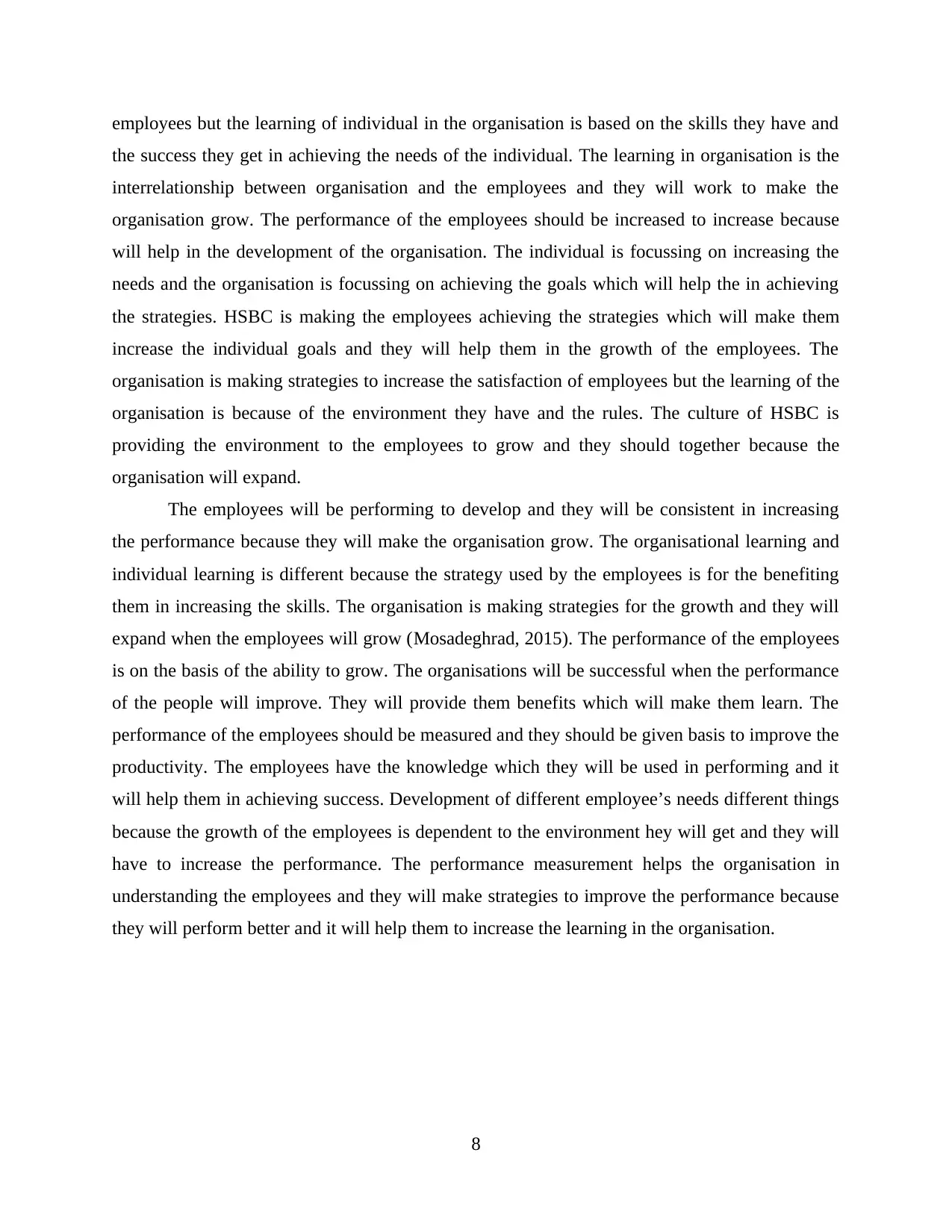
employees but the learning of individual in the organisation is based on the skills they have and
the success they get in achieving the needs of the individual. The learning in organisation is the
interrelationship between organisation and the employees and they will work to make the
organisation grow. The performance of the employees should be increased to increase because
will help in the development of the organisation. The individual is focussing on increasing the
needs and the organisation is focussing on achieving the goals which will help the in achieving
the strategies. HSBC is making the employees achieving the strategies which will make them
increase the individual goals and they will help them in the growth of the employees. The
organisation is making strategies to increase the satisfaction of employees but the learning of the
organisation is because of the environment they have and the rules. The culture of HSBC is
providing the environment to the employees to grow and they should together because the
organisation will expand.
The employees will be performing to develop and they will be consistent in increasing
the performance because they will make the organisation grow. The organisational learning and
individual learning is different because the strategy used by the employees is for the benefiting
them in increasing the skills. The organisation is making strategies for the growth and they will
expand when the employees will grow (Mosadeghrad, 2015). The performance of the employees
is on the basis of the ability to grow. The organisations will be successful when the performance
of the people will improve. They will provide them benefits which will make them learn. The
performance of the employees should be measured and they should be given basis to improve the
productivity. The employees have the knowledge which they will be used in performing and it
will help them in achieving success. Development of different employee’s needs different things
because the growth of the employees is dependent to the environment hey will get and they will
have to increase the performance. The performance measurement helps the organisation in
understanding the employees and they will make strategies to improve the performance because
they will perform better and it will help them to increase the learning in the organisation.
8
the success they get in achieving the needs of the individual. The learning in organisation is the
interrelationship between organisation and the employees and they will work to make the
organisation grow. The performance of the employees should be increased to increase because
will help in the development of the organisation. The individual is focussing on increasing the
needs and the organisation is focussing on achieving the goals which will help the in achieving
the strategies. HSBC is making the employees achieving the strategies which will make them
increase the individual goals and they will help them in the growth of the employees. The
organisation is making strategies to increase the satisfaction of employees but the learning of the
organisation is because of the environment they have and the rules. The culture of HSBC is
providing the environment to the employees to grow and they should together because the
organisation will expand.
The employees will be performing to develop and they will be consistent in increasing
the performance because they will make the organisation grow. The organisational learning and
individual learning is different because the strategy used by the employees is for the benefiting
them in increasing the skills. The organisation is making strategies for the growth and they will
expand when the employees will grow (Mosadeghrad, 2015). The performance of the employees
is on the basis of the ability to grow. The organisations will be successful when the performance
of the people will improve. They will provide them benefits which will make them learn. The
performance of the employees should be measured and they should be given basis to improve the
productivity. The employees have the knowledge which they will be used in performing and it
will help them in achieving success. Development of different employee’s needs different things
because the growth of the employees is dependent to the environment hey will get and they will
have to increase the performance. The performance measurement helps the organisation in
understanding the employees and they will make strategies to improve the performance because
they will perform better and it will help them to increase the learning in the organisation.
8
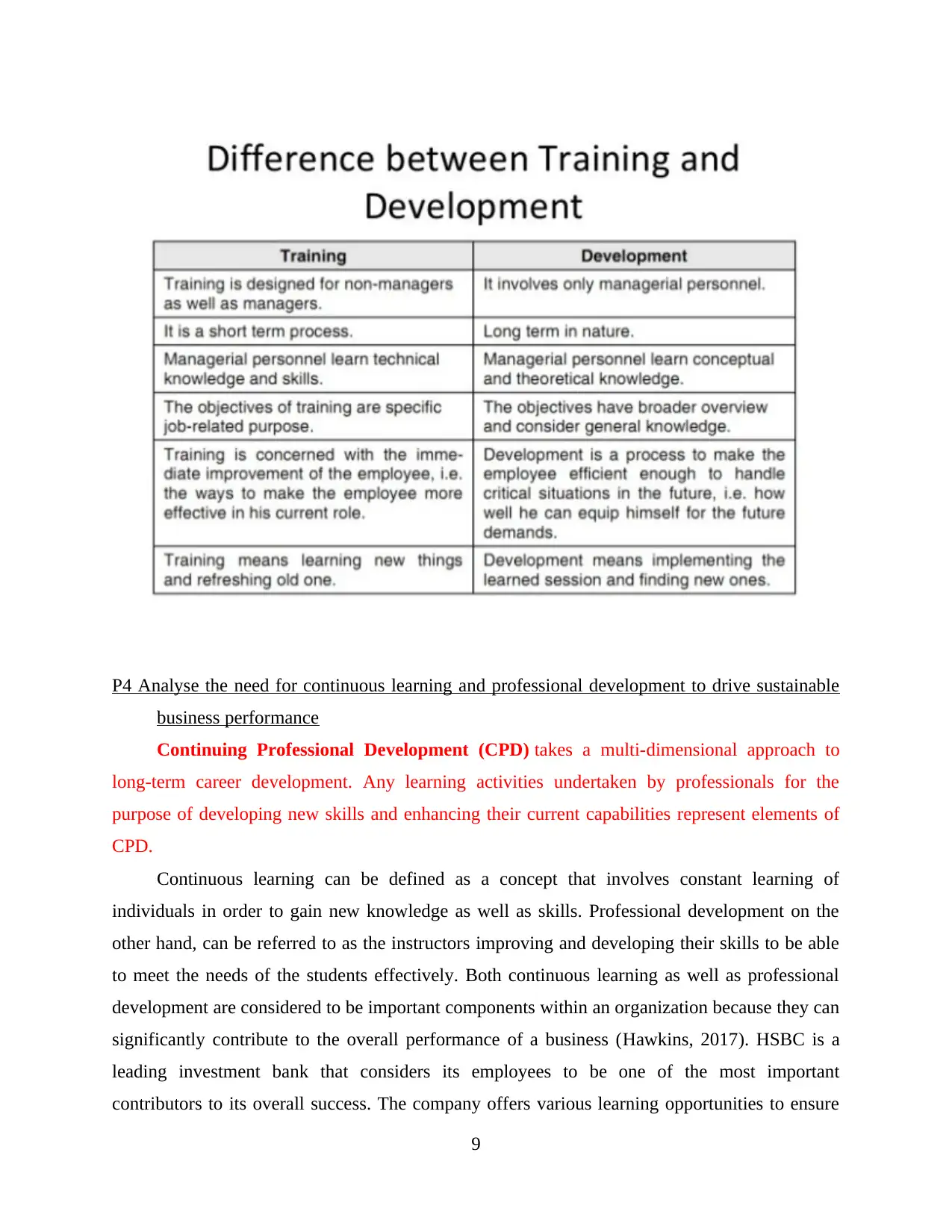
P4 Analyse the need for continuous learning and professional development to drive sustainable
business performance
Continuing Professional Development (CPD) takes a multi-dimensional approach to
long-term career development. Any learning activities undertaken by professionals for the
purpose of developing new skills and enhancing their current capabilities represent elements of
CPD.
Continuous learning can be defined as a concept that involves constant learning of
individuals in order to gain new knowledge as well as skills. Professional development on the
other hand, can be referred to as the instructors improving and developing their skills to be able
to meet the needs of the students effectively. Both continuous learning as well as professional
development are considered to be important components within an organization because they can
significantly contribute to the overall performance of a business (Hawkins, 2017). HSBC is a
leading investment bank that considers its employees to be one of the most important
contributors to its overall success. The company offers various learning opportunities to ensure
9
business performance
Continuing Professional Development (CPD) takes a multi-dimensional approach to
long-term career development. Any learning activities undertaken by professionals for the
purpose of developing new skills and enhancing their current capabilities represent elements of
CPD.
Continuous learning can be defined as a concept that involves constant learning of
individuals in order to gain new knowledge as well as skills. Professional development on the
other hand, can be referred to as the instructors improving and developing their skills to be able
to meet the needs of the students effectively. Both continuous learning as well as professional
development are considered to be important components within an organization because they can
significantly contribute to the overall performance of a business (Hawkins, 2017). HSBC is a
leading investment bank that considers its employees to be one of the most important
contributors to its overall success. The company offers various learning opportunities to ensure
9
⊘ This is a preview!⊘
Do you want full access?
Subscribe today to unlock all pages.

Trusted by 1+ million students worldwide
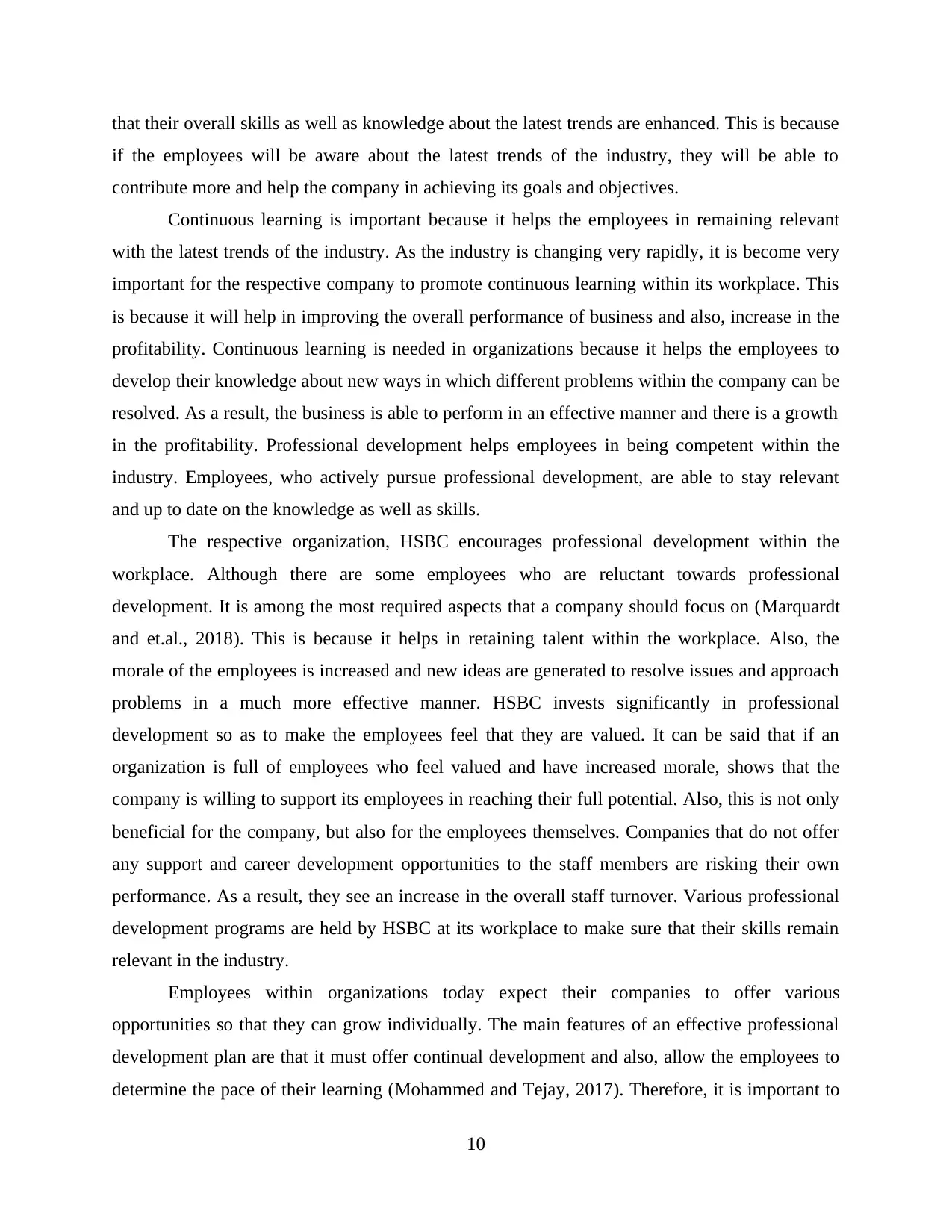
that their overall skills as well as knowledge about the latest trends are enhanced. This is because
if the employees will be aware about the latest trends of the industry, they will be able to
contribute more and help the company in achieving its goals and objectives.
Continuous learning is important because it helps the employees in remaining relevant
with the latest trends of the industry. As the industry is changing very rapidly, it is become very
important for the respective company to promote continuous learning within its workplace. This
is because it will help in improving the overall performance of business and also, increase in the
profitability. Continuous learning is needed in organizations because it helps the employees to
develop their knowledge about new ways in which different problems within the company can be
resolved. As a result, the business is able to perform in an effective manner and there is a growth
in the profitability. Professional development helps employees in being competent within the
industry. Employees, who actively pursue professional development, are able to stay relevant
and up to date on the knowledge as well as skills.
The respective organization, HSBC encourages professional development within the
workplace. Although there are some employees who are reluctant towards professional
development. It is among the most required aspects that a company should focus on (Marquardt
and et.al., 2018). This is because it helps in retaining talent within the workplace. Also, the
morale of the employees is increased and new ideas are generated to resolve issues and approach
problems in a much more effective manner. HSBC invests significantly in professional
development so as to make the employees feel that they are valued. It can be said that if an
organization is full of employees who feel valued and have increased morale, shows that the
company is willing to support its employees in reaching their full potential. Also, this is not only
beneficial for the company, but also for the employees themselves. Companies that do not offer
any support and career development opportunities to the staff members are risking their own
performance. As a result, they see an increase in the overall staff turnover. Various professional
development programs are held by HSBC at its workplace to make sure that their skills remain
relevant in the industry.
Employees within organizations today expect their companies to offer various
opportunities so that they can grow individually. The main features of an effective professional
development plan are that it must offer continual development and also, allow the employees to
determine the pace of their learning (Mohammed and Tejay, 2017). Therefore, it is important to
10
if the employees will be aware about the latest trends of the industry, they will be able to
contribute more and help the company in achieving its goals and objectives.
Continuous learning is important because it helps the employees in remaining relevant
with the latest trends of the industry. As the industry is changing very rapidly, it is become very
important for the respective company to promote continuous learning within its workplace. This
is because it will help in improving the overall performance of business and also, increase in the
profitability. Continuous learning is needed in organizations because it helps the employees to
develop their knowledge about new ways in which different problems within the company can be
resolved. As a result, the business is able to perform in an effective manner and there is a growth
in the profitability. Professional development helps employees in being competent within the
industry. Employees, who actively pursue professional development, are able to stay relevant
and up to date on the knowledge as well as skills.
The respective organization, HSBC encourages professional development within the
workplace. Although there are some employees who are reluctant towards professional
development. It is among the most required aspects that a company should focus on (Marquardt
and et.al., 2018). This is because it helps in retaining talent within the workplace. Also, the
morale of the employees is increased and new ideas are generated to resolve issues and approach
problems in a much more effective manner. HSBC invests significantly in professional
development so as to make the employees feel that they are valued. It can be said that if an
organization is full of employees who feel valued and have increased morale, shows that the
company is willing to support its employees in reaching their full potential. Also, this is not only
beneficial for the company, but also for the employees themselves. Companies that do not offer
any support and career development opportunities to the staff members are risking their own
performance. As a result, they see an increase in the overall staff turnover. Various professional
development programs are held by HSBC at its workplace to make sure that their skills remain
relevant in the industry.
Employees within organizations today expect their companies to offer various
opportunities so that they can grow individually. The main features of an effective professional
development plan are that it must offer continual development and also, allow the employees to
determine the pace of their learning (Mohammed and Tejay, 2017). Therefore, it is important to
10
Paraphrase This Document
Need a fresh take? Get an instant paraphrase of this document with our AI Paraphraser
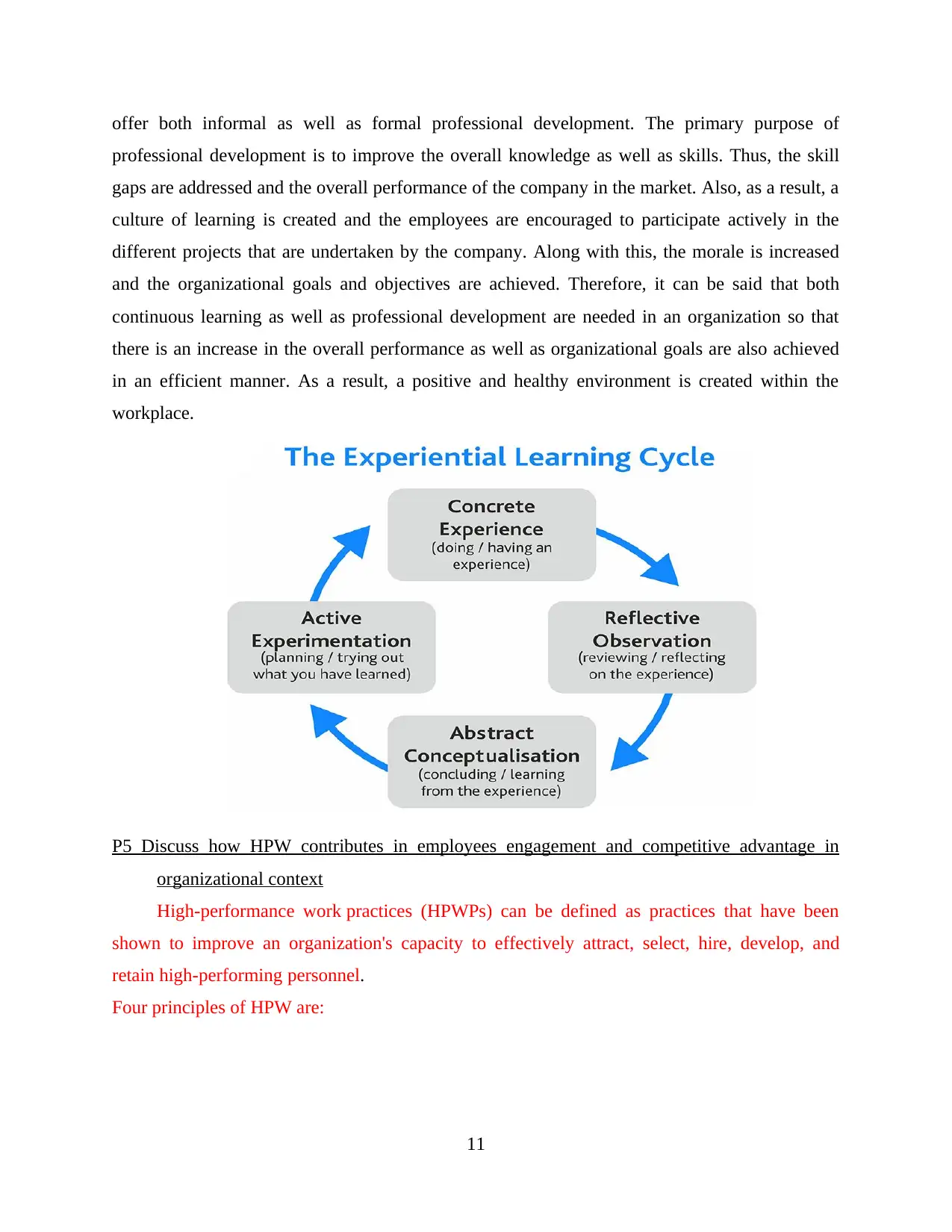
offer both informal as well as formal professional development. The primary purpose of
professional development is to improve the overall knowledge as well as skills. Thus, the skill
gaps are addressed and the overall performance of the company in the market. Also, as a result, a
culture of learning is created and the employees are encouraged to participate actively in the
different projects that are undertaken by the company. Along with this, the morale is increased
and the organizational goals and objectives are achieved. Therefore, it can be said that both
continuous learning as well as professional development are needed in an organization so that
there is an increase in the overall performance as well as organizational goals are also achieved
in an efficient manner. As a result, a positive and healthy environment is created within the
workplace.
P5 Discuss how HPW contributes in employees engagement and competitive advantage in
organizational context
High-performance work practices (HPWPs) can be defined as practices that have been
shown to improve an organization's capacity to effectively attract, select, hire, develop, and
retain high-performing personnel.
Four principles of HPW are:
11
professional development is to improve the overall knowledge as well as skills. Thus, the skill
gaps are addressed and the overall performance of the company in the market. Also, as a result, a
culture of learning is created and the employees are encouraged to participate actively in the
different projects that are undertaken by the company. Along with this, the morale is increased
and the organizational goals and objectives are achieved. Therefore, it can be said that both
continuous learning as well as professional development are needed in an organization so that
there is an increase in the overall performance as well as organizational goals are also achieved
in an efficient manner. As a result, a positive and healthy environment is created within the
workplace.
P5 Discuss how HPW contributes in employees engagement and competitive advantage in
organizational context
High-performance work practices (HPWPs) can be defined as practices that have been
shown to improve an organization's capacity to effectively attract, select, hire, develop, and
retain high-performing personnel.
Four principles of HPW are:
11
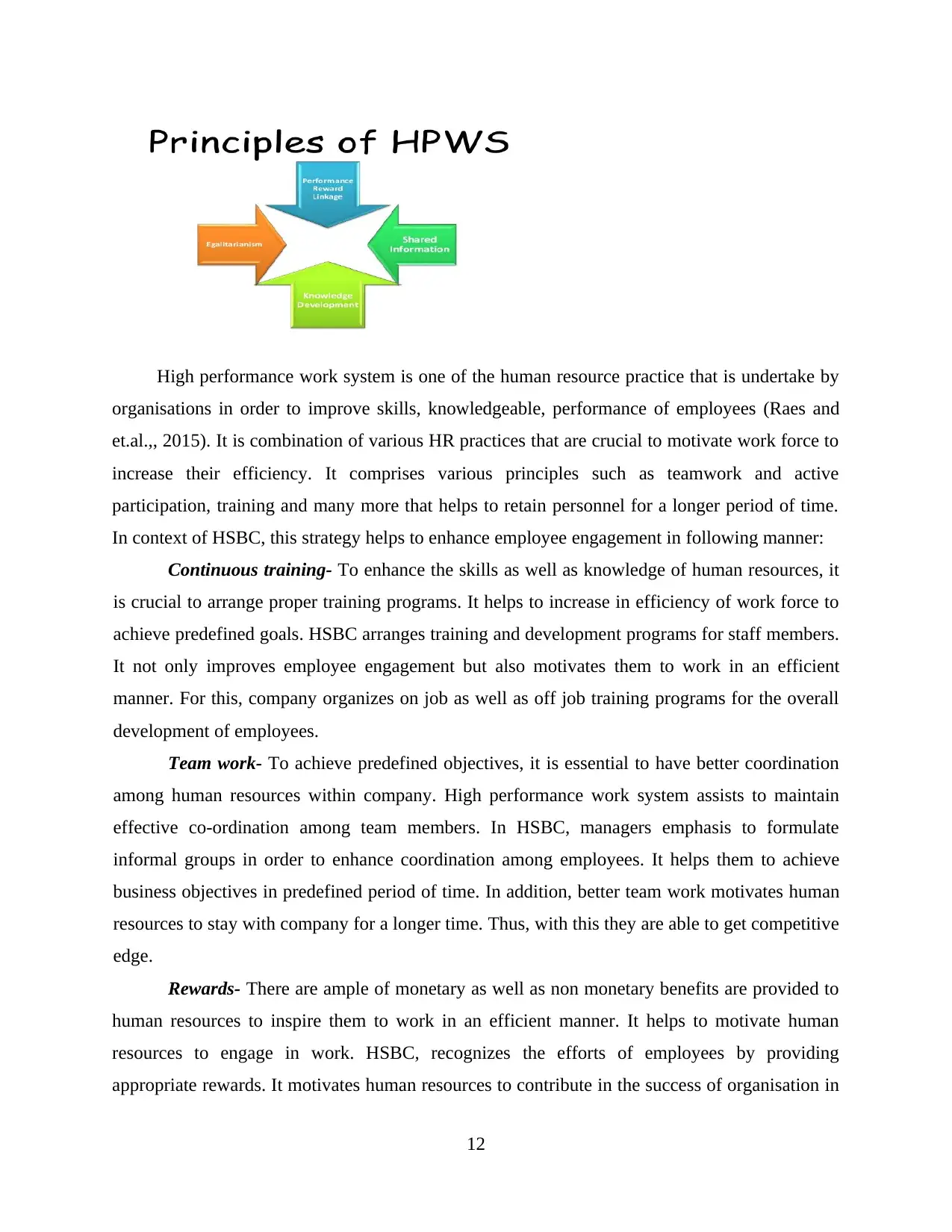
High performance work system is one of the human resource practice that is undertake by
organisations in order to improve skills, knowledgeable, performance of employees (Raes and
et.al.,, 2015). It is combination of various HR practices that are crucial to motivate work force to
increase their efficiency. It comprises various principles such as teamwork and active
participation, training and many more that helps to retain personnel for a longer period of time.
In context of HSBC, this strategy helps to enhance employee engagement in following manner:
Continuous training- To enhance the skills as well as knowledge of human resources, it
is crucial to arrange proper training programs. It helps to increase in efficiency of work force to
achieve predefined goals. HSBC arranges training and development programs for staff members.
It not only improves employee engagement but also motivates them to work in an efficient
manner. For this, company organizes on job as well as off job training programs for the overall
development of employees.
Team work- To achieve predefined objectives, it is essential to have better coordination
among human resources within company. High performance work system assists to maintain
effective co-ordination among team members. In HSBC, managers emphasis to formulate
informal groups in order to enhance coordination among employees. It helps them to achieve
business objectives in predefined period of time. In addition, better team work motivates human
resources to stay with company for a longer time. Thus, with this they are able to get competitive
edge.
Rewards- There are ample of monetary as well as non monetary benefits are provided to
human resources to inspire them to work in an efficient manner. It helps to motivate human
resources to engage in work. HSBC, recognizes the efforts of employees by providing
appropriate rewards. It motivates human resources to contribute in the success of organisation in
12
organisations in order to improve skills, knowledgeable, performance of employees (Raes and
et.al.,, 2015). It is combination of various HR practices that are crucial to motivate work force to
increase their efficiency. It comprises various principles such as teamwork and active
participation, training and many more that helps to retain personnel for a longer period of time.
In context of HSBC, this strategy helps to enhance employee engagement in following manner:
Continuous training- To enhance the skills as well as knowledge of human resources, it
is crucial to arrange proper training programs. It helps to increase in efficiency of work force to
achieve predefined goals. HSBC arranges training and development programs for staff members.
It not only improves employee engagement but also motivates them to work in an efficient
manner. For this, company organizes on job as well as off job training programs for the overall
development of employees.
Team work- To achieve predefined objectives, it is essential to have better coordination
among human resources within company. High performance work system assists to maintain
effective co-ordination among team members. In HSBC, managers emphasis to formulate
informal groups in order to enhance coordination among employees. It helps them to achieve
business objectives in predefined period of time. In addition, better team work motivates human
resources to stay with company for a longer time. Thus, with this they are able to get competitive
edge.
Rewards- There are ample of monetary as well as non monetary benefits are provided to
human resources to inspire them to work in an efficient manner. It helps to motivate human
resources to engage in work. HSBC, recognizes the efforts of employees by providing
appropriate rewards. It motivates human resources to contribute in the success of organisation in
12
⊘ This is a preview!⊘
Do you want full access?
Subscribe today to unlock all pages.

Trusted by 1+ million students worldwide
1 out of 16
Related Documents
Your All-in-One AI-Powered Toolkit for Academic Success.
+13062052269
info@desklib.com
Available 24*7 on WhatsApp / Email
![[object Object]](/_next/static/media/star-bottom.7253800d.svg)
Unlock your academic potential
Copyright © 2020–2026 A2Z Services. All Rights Reserved. Developed and managed by ZUCOL.





